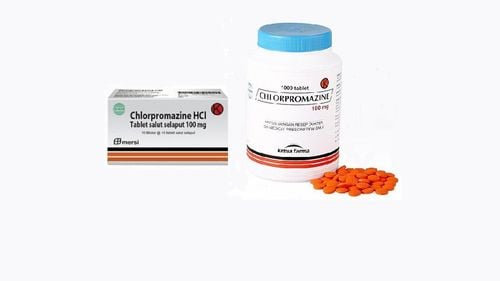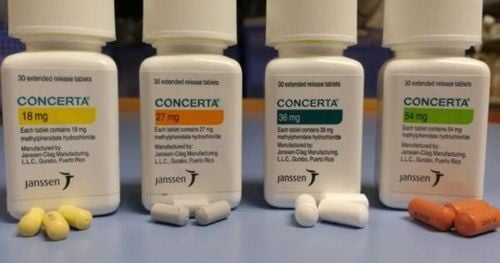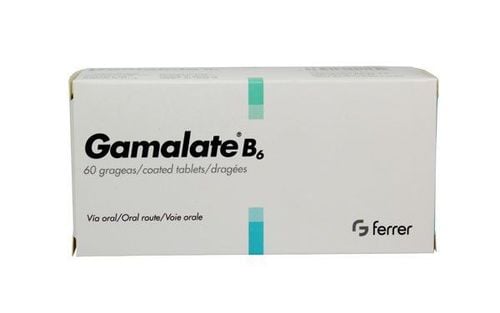This is an automatically translated article.
Aripiprazole is a psychotropic drug widely used in the treatment of schizophrenia or acute manic episodes. This active ingredient is in the drug Abilify 15mg. So what should be noted when using Abilify Tablets 15mg?1. What is Abilify tablet 15mg?
Abilify 15mg contains the active ingredient Aripiprazole 15mg. Abilify Tablets 15mg is a product of Korea Otsuka Pharm Co., Ltd (Korea), circulated in Vietnam with serial number VN3-82-18, made in tablet form and packed in a box of 3 blisters x 10 tablets.
2. Indications of the drug Abilify 15mg
Indications of the drug Abilify 15mg in the following cases:
Treatment of schizophrenia in adults and adolescents 15 years of age and older; Treatment of moderate to severe manic episodes in bipolar I disorder; Prevention of new manic episodes in adult patients experiencing a major manic episode and responding to Aripiprazole.
3. Dosage of Abilify Tablets 15mg
3.1. Treatment of schizophrenia The starting and target dose of Aripiprazole is 10-15 mg/day, taken as a single dose and independent of meals. The dose of Aripiprazole can vary from 10-30 mg/day, however higher doses of 10-15 mg/day are not more effective. Note, do not increase the dose before 2 weeks, because this is the time it takes for Abilify 15mg to reach steady state.
Aripiprazole maintenance dose: There are no studies on the efficacy of long-term Aripiprazole use. However, there are some systematic reviews of patients with schizophrenia who have been symptomatically stable with other antipsychotics for more than 3 months, who have discontinued those agents and taken Abilify Tablets 15 mg daily. Subsequent follow-up follow-up for 26 weeks suggests that maintenance therapy may be beneficial.
3.2. Bipolar mania The starting dose of Aripiprazole is 30mg (equivalent to 2 Abilify 15mg tablets), taken once a day, about 15% of patients can reduce the dose to 15mg (1 Abilify Tablets 15mg) depending on tolerability. load. Safety at doses higher than 30 mg/day has not been evaluated in clinical trials. Aripiprazole Maintenance Dose: There are no controlled studies to provide long-term dosing recommendations in patients with improvement after treatment of acute manic episodes with Aripiprazole. Although treatment with Abilify 15 mg is necessary to prevent recurrence of acute manic episodes, there is no evidence to support the use of Aripiprazole for longer than 3 weeks.
4. Side effects of Abilify Tablets 15mg
Systemic side effects:
Abilify 15mg often causes flu-like syndrome, chest pain, stiff neck, limb stiffness, neck pain, pelvic pain; Less common are facial edema, suicidal thoughts, malaise, migraine, chills, increased photosensitivity, jaw pain, abdominal bloating, tightness in the chest, and sore throat. Side effects on the cardiovascular system of the drug Abilify 15mg:
Common is tachycardia (including ventricular and supraventricular tachycardia), hypotension or bradycardia; Less commonly palpitations, heart failure, myocardial infarction, cardiac arrest, atrial fibrillation, atrioventricular block, QT prolongation, extrasystoles, myocardial ischemia, deep vein thrombosis, pain angina and phlebitis. Side effects on the digestive system of the drug Abilify 15mg
Common manifestations are nausea, vomiting; Less commonly, increased appetite, dysphagia, gastroenteritis, gingivitis, gastrointestinal bleeding, gastroesophageal reflux, rectal bleeding, colitis, mouth ulcers; Rarely, patients have esophagitis, vomiting blood, intestinal obstruction, gastrointestinal ulceration, hematuria or pancreatitis. Side effects of Abilify 15mg on the endocrine system:
Rarely patients with hypothyroidism due to Abilify 15mg; More rarely, goiter or hyperthyroidism.
5. Drug interactions of Abilify Tablets 15mg
Aripiprazole acts mainly on the central nervous system, so caution should be exercised when Abilify 15mg is combined with alcohol and other drugs that affect the central nervous system. Because Aripiprazole acts as an antagonist to alpha1-adrenergic receptors, Abilify 15mg has the potential to increase the effect of some antihypertensive drugs. Enzymes CYP3A4 and CYP2D6 are responsible for the metabolism of Aripiprazole. Therefore, inducers of CYP3A4 enzymes (such as Carbamazepine) may increase the clearance of Aripiprazole and decrease the blood concentration of Abilify 15 mg. Drugs that inhibit CYP3A4 (such as Ketoconazole) or that inhibit CYP2D6 (such as Quinidine, Fluoxetin or Paroxetine) can inhibit the elimination of Aripiprazole, thereby causing an increase in blood levels of Abilify 15 mg. Aripiprazole has no clinically significant pharmacokinetic interactions with drugs metabolized by cytochrome P450 enzymes. In vivo studies at doses of 10-30 mg/day showed that Aripiprazole did not affect the metabolism of substrates of CYP2D6 (eg, Dextromethorphan), CYP2C9 (Warfarin), CYP2C19 (Omeprazole, Warfarin) and CYP3A4 (Dextromethorphan). There were no significant differences between Abilify 15 mg plus Ethanol and placebo plus Ethanol in the effects on dexterity or in response to stimuli in healthy subjects. However, like other psychotropic drugs, patients should be warned not to drink alcohol while taking Abilify 15mg.
6. Precautions while using Abilify Tablets 15mg
Neuroleptic Malignant Syndrome:
This syndrome is potentially fatal in people taking antipsychotics, including Aripiprazole; Clinical manifestations include high fever, muscle stiffness, altered mental status, and symptoms of autonomic instability (pulse or blood pressure changes, tachycardia, sweating, and arrhythmia). ..; The diagnosis of neuroleptic malignant syndrome due to Abilify 15mg is very complicated, it is necessary to exclude cases with clinical manifestations of serious diseases (such as pneumonia, systemic infections...) and external symptoms. untreated or inadequately treated towers; Treatment of neuroleptic malignant syndrome may include immediate discontinuation of Abilify 15mg, symptomatic treatment and monitoring of the condition; If the patient is indicated for use with Abilify 15mg after recovery from the neuroleptic malignant syndrome, reintroduction of the drug should be considered. Also monitor the patient closely, as there have been reports of recurrence of neuroleptic malignant syndrome. Tardive dyskinesia:
Reversible tardive dyskinesia has been reported in patients treated with antipsychotic drugs such as Abilify 15mg, especially in the elderly; Whether antipsychotic preparations differ in their potential to cause tardive dyskinesia is unknown; There is no specific treatment for patients with tardive dyskinesia. However, this syndrome may resolve (partially or completely) on its own with discontinuation of antipsychotic drugs; If signs and symptoms of tardive dyskinesia develop in a patient being treated with Abilify 15mg, discontinuation should be considered. However, some cases, despite having this syndrome, still require continued treatment with Aripiprazole.
7. Notes when using Abilify 15mg
Caution should be used when prescribing Abilify 15mg to patients with cardiovascular disease (including history of myocardial infarction, myocardial ischemia, heart failure and conduction abnormalities), cerebrovascular disease or other conditions. conditions that cause a drop in blood pressure (such as dehydration, blood loss, and treatment with antihypertensive drugs). As with other psychoactive drugs, caution should be exercised when Abilify 15 mg is administered to patients with a history of seizures or with conditions that lower the seizure threshold (eg, Alzheimer's-type dementia). Abilify 15mg drug can adversely affect the body's ability to regulate body temperature, so caution should be taken when prescribing Abilify 15mg to patients with conditions that increase body temperature (such as heavy labor, ambient temperature). too high, combination of anticholinergic drugs or dehydration). Esophageal contractility and aspiration are common with antipsychotics such as Abilify 15mg, therefore caution should be exercised when prescribing Aripiprazole and other antipsychotics in patients at risk for aspiration pneumonia. As suicidal ideation is a symptom in people with mental illness, special care should be taken when administering Abilify 15mg to patients at high risk for this condition. The efficacy and safety of Aripiprazole for use in psychotic patients with dementia have not been evaluated. Therefore, when prescribing Abilify 15mg to these subjects, special caution should be exercised if the patient has difficulty swallowing or excessive drowsiness. Clinical experience with Aripiprazole in patients with comorbid systemic disease is limited. There are no evaluations for the use of Abilify 15mg in patients with a recent history of myocardial infarction or unstable heart disease. Animal studies have shown that Aripiprazole is teratogenic, including teratogenicity in laboratory rats and rabbits. However, studies in pregnant patients have not been performed. Therefore, Abilify 15mg is contraindicated for this subject. The effects of Abilify 15mg on labor and delivery in humans are unknown. Aripiprazole is excreted in the milk of rats during lactation. However, it is not known whether Aripiprazole and its metabolites pass into human milk, so mothers taking Abilify 15mg must stop breastfeeding. Abilify 15mg contains the active ingredient Aripiprazole 15mg. This is a psychotropic drug indicated for the treatment of schizophrenia or bipolar disorder. To ensure the effectiveness of treatment and avoid unwanted side effects, patients need to strictly follow the instructions of the doctor, professional pharmacist.
Follow Vinmec International General Hospital website to get more health, nutrition and beauty information to protect the health of yourself and your loved ones in your family.
Please dial HOTLINE for more information or register for an appointment HERE. Download MyVinmec app to make appointments faster and to manage your bookings easily.













